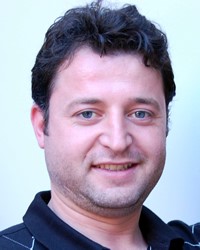Turk in Bulgaria

Photo Source:
Anonymous
|
Send Joshua Project a map of this people group.
|
| People Name: | Turk |
| Country: | Bulgaria |
| 10/40 Window: | No |
| Population: | 510,000 |
| World Population: | 66,822,900 |
| Primary Language: | Turkish |
| Primary Religion: | Islam |
| Christian Adherents: | 0.11 % |
| Evangelicals: | 0.01 % |
| Scripture: | Complete Bible |
| Ministry Resources: | Yes |
| Jesus Film: | Yes |
| Audio Recordings: | Yes |
| People Cluster: | Turkish |
| Affinity Bloc: | Turkic Peoples |
| Progress Level: |
|
Introduction / History
Rumelian Turks are descendants of the Ottoman Turks who migrated from Central Asia during the thirteenth century, conquered Anatolia (modern day Turkey), and eventually established the Ottoman Empire. At its peak, the Ottoman Empire encompassed the Balkan Mountains, Arabia and North Africa. During this time Turks settled in Bulgarian towns and served as military personnel or administrators or worked as craftsmen. The nearly five hundred years of Ottoman-Turkish dominion significantly impacted the Bulgarian language, culture and economic development. The large Turkish minority in Bulgaria and the strained relations between the Bulgarians and the Turks—both individually and nationally—are partly the consequences of this period.
Since Bulgaria's independence in 1878, thousands of Turks have migrated back to Turkey. The remaining Turkish community has suffered growing discrimination and resentment by the Bulgarian population. During communist rule in Bulgaria (from 1947 to 1989), Muslim Turks, with their "outdated" religious customs, were considered an obstacle to a modern industrialized society.
From 1984 to 1989, the communist government carried out a bitter persecution program against the Turks, forcing them to take Bulgarian names, destroying Muslim sections in cemeteries, and forbidding Islamic religious practices. Thousands were beaten, imprisoned or killed. At the height of the persecution in 1989, an additional 350,000 Turks fled to Turkey, overwhelming that country with refugees at a time of high unemployment.
Today Turks are the largest minority in Bulgaria.
What Are Their Lives Like?
A palace coup in 1989 brought down the communist dictator. They reinstated Turkish names, Turks were allowed to speak Turkish openly, and Bulgaria lifted restrictions on Islamic religious practices. The cultural rights of Turks are now generally well respected, but they are disadvantaged relative to the Bulgarians in terms of income, presence in the professions and in the commercial sector. However, the Turks believe they are under-represented politically in Bulgaria. Others feel like they are equal to the ethnic Bulgarians.
Because of religious, linguistic, and social differences, Turks have not often intermarried with the local Bulgarians. If Turkish men marry outside their community, the usually chose Muslim, non-Turkish women.
The Turks favor dishes made with lamb and vegetables. They also enjoy milk products such as yogurt and cheeses, as well as strong Turkish coffee. The export-oriented agricultural business is where most Rumelian Turks now work.
What Are Their Beliefs?
Most Rumelian Turks in Bulgaria are Sunni Muslim, even though the communists closed most of their mosques and converted them into schools, libraries, museums and government buildings. Today, the mosques are being restored and rebuilt. Financial support from Turkey and Saudi Arabia has enabled Rumelian Turks to build Islamic schools and finance the training of Muslim teachers. Although Muslim missionaries from Turkey and Iran are endeavoring to make Rumelian Turks stronger Muslims, many Turks consider themselves secularists or atheists because they are frustrated with Islamic fundamentalism, corruption and hypocrisy. They are not open to Christianity because they have had so many Christian enemies in their past.
What Are Their Needs?
The Turks in Bulgaria have very few opportunities to respond to the gospel. They have the JESUS Film and radio broadcasts in Turkish, but they need loving followers of Christ to go to them.
Prayer Points
Pray that the sheer wonder of knowing Jesus and the impact he has on their lives and the joy he brings spur believers to share Christ with the Turkish people in Bulgaria.
Pray the hearts of the Turkish people would be stirred by a sovereign work of the Holy Spirit readying them for the time when they hear and respond to the gospel.
Pray Turks will experience dreams and visions of Jesus leading them into a saving relationship with him.
Pray for an unstoppable movement to Christ among the Turks in Bulgaria.